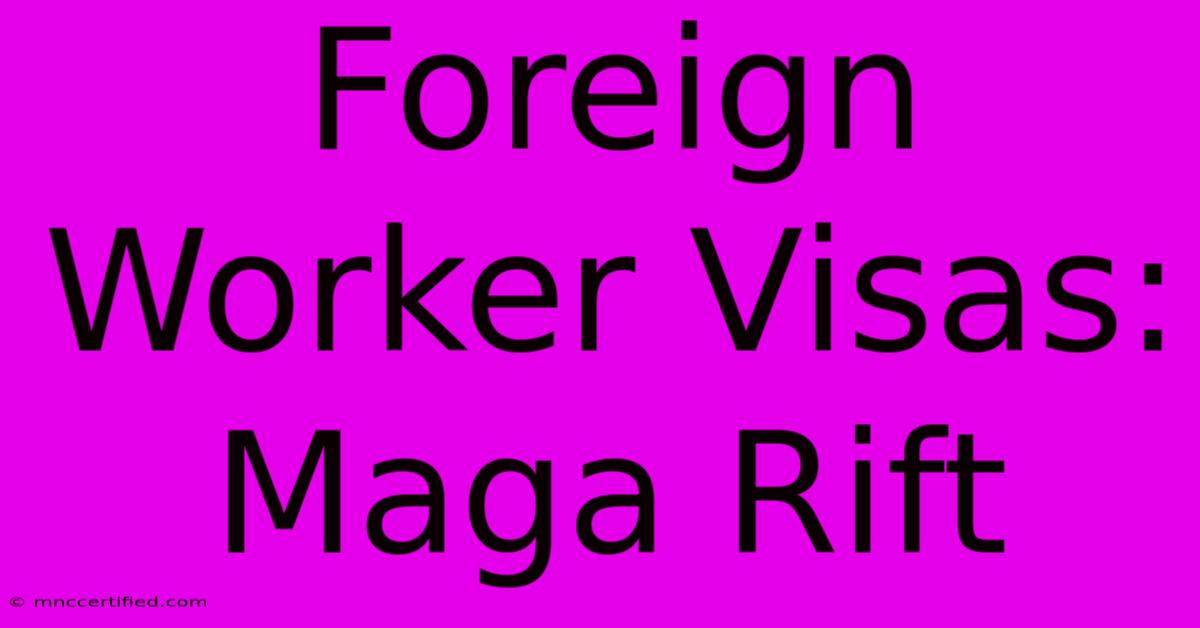Foreign Worker Visas: Maga Rift

Table of Contents
Foreign Worker Visas: A MAGA Rift
The issue of foreign worker visas has become a significant fault line within the MAGA (Make America Great Again) movement, revealing a complex and often contradictory set of priorities among its supporters. While a core tenet of MAGA rhetoric centers on protecting American jobs and prioritizing American citizens, the economic realities of many industries reliant on foreign labor create internal tensions and conflicting viewpoints. This article will delve into the complexities of this internal debate, exploring the arguments from both sides and analyzing the potential consequences for the movement and the nation.
The Pro-Restriction Stance: Protecting American Workers
A significant portion of MAGA supporters advocate for stricter immigration policies, including a significant reduction in foreign worker visas. Their arguments often center on the following points:
- Job Displacement: The most common argument is that foreign workers, often willing to accept lower wages or work in less desirable conditions, displace American workers, depressing wages and hindering economic advancement for native-born citizens. This is particularly felt in sectors like agriculture, construction, and hospitality.
- Wage Depression: The influx of foreign workers, particularly those on temporary visas, is seen as contributing to a decline in wages for low-skilled and some mid-skilled jobs. This fuels concerns about economic inequality and the shrinking middle class.
- National Security Concerns: While less frequently cited than job displacement and wage depression, some within the MAGA movement express concerns about the potential security risks associated with a large influx of foreign workers. This argument often focuses on the challenges of thorough vetting processes.
The Pro-Visa Stance: Economic Realities and Business Needs
Despite the dominant narrative of restriction, a counter-argument exists within the MAGA movement, acknowledging the crucial role foreign workers play in the American economy. Proponents of maintaining or even expanding certain visa programs highlight:
- Economic Contributions: Foreign workers contribute significantly to the US economy through their labor, taxes, and entrepreneurial endeavors. Many industries, particularly those facing labor shortages, rely heavily on these workers to maintain operations and competitiveness.
- Filling Skills Gaps: Many specialized jobs require skills not readily available within the US workforce. Foreign workers with these specialized skills help fill critical gaps, driving innovation and economic growth. This is particularly true in high-tech sectors and medicine.
- Agricultural Needs: The agricultural sector, a cornerstone of many MAGA-supporting communities, heavily relies on foreign workers for seasonal labor. Restricting access to these workers could severely impact food production and prices.
The Internal Contradiction: Reconciling Values and Realities
The tension surrounding foreign worker visas within the MAGA movement highlights a fundamental contradiction: the desire to prioritize American workers and simultaneously maintain a thriving economy. This necessitates a nuanced approach that moves beyond simplistic slogans and considers the complex interplay of economic factors and social values. The lack of a cohesive and internally consistent stance on this issue exposes a vulnerability within the movement.
The Future of Foreign Worker Visas in the MAGA Agenda
The future of foreign worker visas within the MAGA framework remains uncertain. The internal debate will likely continue, shaped by economic conditions, political maneuvering, and evolving public opinion. Finding a balance between protecting American workers and ensuring economic prosperity will be a significant challenge requiring thoughtful policy solutions that address the concerns of all stakeholders.
Conclusion: A Necessary Conversation
The debate surrounding foreign worker visas within the MAGA movement is not merely a political squabble; it’s a reflection of deep-seated anxieties about the future of work, the American economy, and the nation's identity. Open and honest dialogue, informed by data and a willingness to consider diverse perspectives, is crucial to navigating this complex issue and formulating policies that benefit both American workers and the overall economy. Ignoring the internal contradictions will only serve to further fracture the movement and hinder its ability to achieve its stated goals.

Thank you for visiting our website wich cover about Foreign Worker Visas: Maga Rift. We hope the information provided has been useful to you. Feel free to contact us if you have any questions or need further assistance. See you next time and dont miss to bookmark.
Featured Posts
-
Gladiator 2 5 Expected Plot Points
Dec 28, 2024
-
Vanderbilt Vs Football 2024 Birmingham Bowl Images
Dec 28, 2024
-
Dua Lipa And Callum Turner Engagement Rumors
Dec 28, 2024
-
Legendary Sportscaster Greg Gumbel Dead At 78
Dec 28, 2024
-
Washington State Vs Syracuse Live Game
Dec 28, 2024